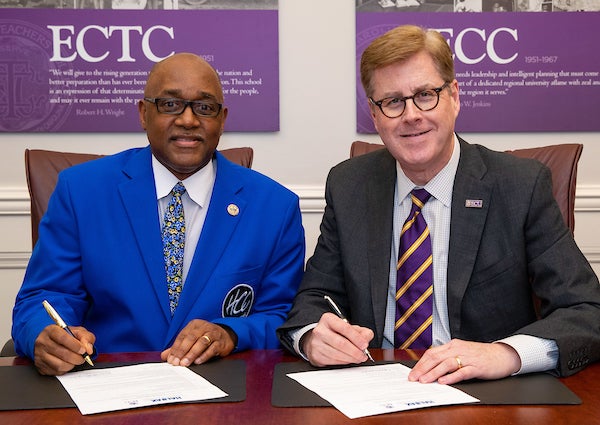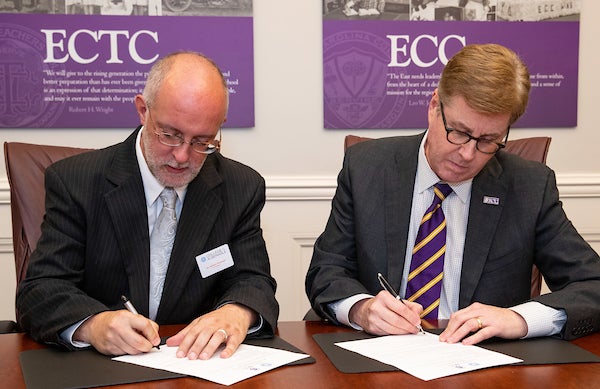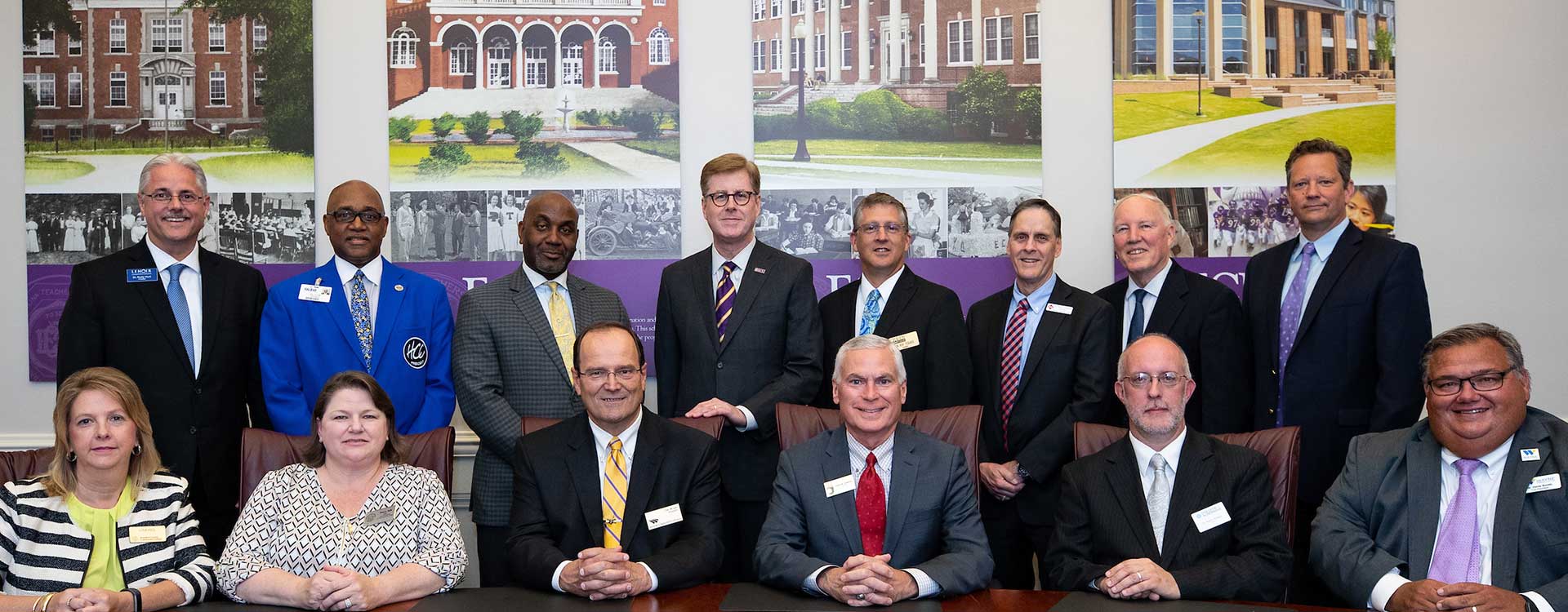BREAKING BARRIERS
ECU partners with community colleges to improve transfer student access, success
East Carolina University and 14 community colleges in the surrounding region have signed a co-admission agreement designed to improve transfer student access and success through a collaborative degree completion program.
Students will apply to a participating community college and ECU simultaneously and commit to maintaining full-time status. Upon completing an associate degree, they will seamlessly transition into degree-completion programs at ECU.
“Our most fundamental goal is to make college attendance a far less daunting endeavor for these students who might not think that going to college is within their reach,” said Dr. Ron Mitchelson, ECU Provost. “In particular we want these students to understand that the community college/university pathway is very cost effective and to ensure that the transfer from the community college to the university is relatively seamless.”

Dr. Michael Elam, left, president of Halifax Community College, and ECU Chancellor Cecil Staton signed a co-admission agreement between the two institutions.
Mitchelson pointed out that completing the first two years of a four-year degree at a community college can save a student $43,000, according to a national report from the Educational Advisory Board. Other benefits to students include access to ECU libraries and programming through the ECU Office of Student Activities and other organizations, ECU One Card eligibility, joint financial aid counseling and micro-scholarship opportunities, joint academic advising, and a waiver of the ECU transfer application fee.
“We want each of these students to feel like a Pirate as they complete their associate degree with the community college,” Mitchelson said.
Participating community colleges include Beaufort County Community College, Carteret Community College, College of the Albemarle, Craven Community College, Halifax Community College, Johnston Community College, Lenoir Community College, Martin Community College, Nash Community College, Pamlico Community College, Pitt Community College, Roanoke-Chowan Community College, Wayne Community College and Wilson Community College.
During a signing ceremony and reception on June 5, ECU’s chancellor, Dr. Cecil Staton, thanked the presidents and representatives of the community colleges for their role in furthering the education of North Carolina students.
“The agreements that we will share with your institutions are really strategic to our mission at ECU, where we are committed to degree completion and helping our students be successful,” he said.
Staton recognized that on average, students who transfer from community colleges after receiving an associate degree outperform traditional students. “It’s very important that we provide those pathways … to come here and complete their education, and for those pathways to be easier and more accessible, where the barriers are taken away, in order for them to achieve that baccalaureate degree,” he said.
Dr. Dennis Massey, president of Pitt Community College, said a better coordinated relationship between the community college and the university will help students earn credits more efficiently. “It helps their credits go further and makes their time more productive,” he said. “It gets them that much closer to a degree, and that’s the name of the game.”
ECU is the top transfer receiving institution for Johnston Community College, said Dr. David Johnson, JCC president.
“One of our challenges has been to transition students into four-year institutions after they graduate, and this will make it absolutely seamless for our students,” he said. “It will ease the process and will help them, being a dual JCC/ECU student and having access to the services that ECU can provide while they’re here.”
Like the participating community colleges, ECU serves many students from rural and economically disadvantaged counties. Lisa Hill, dean of arts and sciences at Beaufort County Community College, said the co-admission program will help increase the number of students who are able to go on to complete a four-year degree.
“It will create a direct pathway and keep students on a path to completion,” she said. “Having that communication and that personal contact with the university will really help a lot of students.”

Dr. Robert Wynegar, president of College of the Albemarle, signs a co-admission agreement alongside ECU Chancellor Cecil Staton.
Mitchelson said the program will help make students aware of the academic programs, facilities and services that ECU offers. “We want these students to understand the career pathways that they consider with sufficient detail to choose courses wisely,” he said. “As much as possible, we want these future Pirates to experience campus life and to engage in the rich activities that we have to offer them, ranging from the arts to athletics.”
The new co-admission program, expected to begin this fall, provides more access to academic programs and support services than the narrower articulation agreements that exist between individual community colleges and ECU for specific degree programs. These broader agreements do not supplant those existing bilateral agreements, Michelson said.
The co-admission program, said Staton, will be a boon to both ECU and the community colleges in producing the teachers, nurses, engineers, business leaders and health professionals that the region needs to meet its future workforce demands.
“This is precisely the sort of collaboration we need to better serve the people of North Carolina and the east in particular,” Staton said. “We cannot be successful and continue to produce capable and engaged citizens who will go out across the communities of this state and make a difference if we don’t have a vital partnership with our community college system. We value what you do, we value your students, and we value our partnership.”
